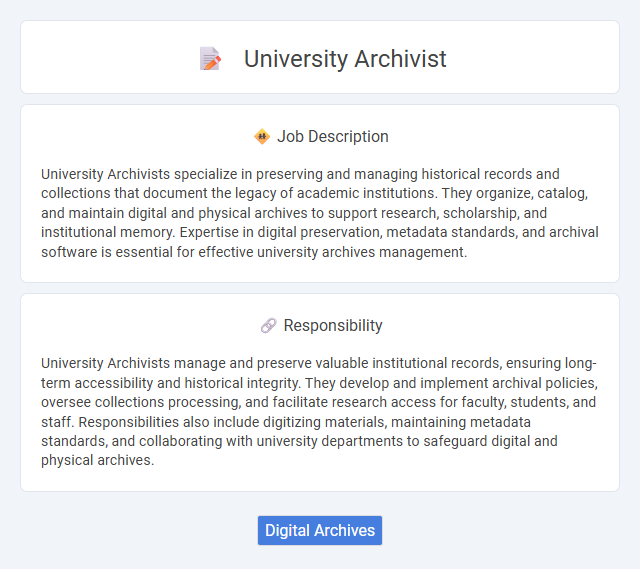
University Archivists specialize in preserving and managing historical records and collections that document the legacy of academic institutions. They organize, catalog, and maintain digital and physical archives to support research, scholarship, and institutional memory. Expertise in digital preservation, metadata standards, and archival software is essential for effective university archives management.
Individuals who are detail-oriented and possess strong organizational skills are likely to excel as University Archivists due to the meticulous nature of managing historical records and digital assets. Candidates with a passion for history and preservation combined with patience and analytical thinking may find this role particularly suitable. Those who prefer dynamic, fast-paced environments might find the archival work less engaging, as it often requires consistent focus and routine tasks.
Qualification
A University Archivist must possess a Master's degree in Library Science, Archival Studies, or Information Management, often with specialized training in digital preservation and records management. Proven experience in maintaining and organizing academic records, historical documents, and rare collections using archival software is essential. Strong understanding of metadata standards, copyright laws, and data privacy policies, coupled with excellent research and communication skills, enhances the effectiveness of a University Archivist.
Responsibility
University Archivists manage and preserve valuable institutional records, ensuring long-term accessibility and historical integrity. They develop and implement archival policies, oversee collections processing, and facilitate research access for faculty, students, and staff. Responsibilities also include digitizing materials, maintaining metadata standards, and collaborating with university departments to safeguard digital and physical archives.
Benefit
The University Archivist position likely offers significant benefits such as long-term job stability and access to a wealth of historical resources, which can enhance professional development. Employees might also enjoy collaborative opportunities with faculty and researchers, contributing to important academic projects. There is a probable advantage in gaining specialized expertise in archival preservation and digital curation within an academic environment.
Challenge
The University Archivist may face significant challenges in managing and preserving vast and diverse collections of historical records while ensuring accessibility and compliance with legal standards. Balancing the integration of digital technologies with traditional archival methods could require continuous adaptation and problem-solving. There is a probability that protecting sensitive information amidst increasing data privacy concerns will demand meticulous attention and updated policies.
Career Advancement
University Archivists manage, preserve, and provide access to institutional records and historical documents, supporting research and academic missions. Career advancement opportunities often include roles such as Senior Archivist, Digital Archivist, or Head of Special Collections, emphasizing expertise in digital preservation, metadata standards, and information management technologies. Developing skills in archival software, grant writing, and leadership can accelerate progression to director-level positions within academic libraries or cultural heritage institutions.
Key Terms
Digital Archives
University Archivists specializing in Digital Archives manage the acquisition, preservation, and accessibility of digital records, ensuring long-term usability and integrity of electronic documents. They implement advanced digital preservation technologies and metadata standards to maintain archival authenticity and facilitate efficient information retrieval. Expertise in digital asset management systems and archival software is essential for organizing, curating, and providing access to growing digital collections within academic institutions.
 kuljobs.com
kuljobs.com